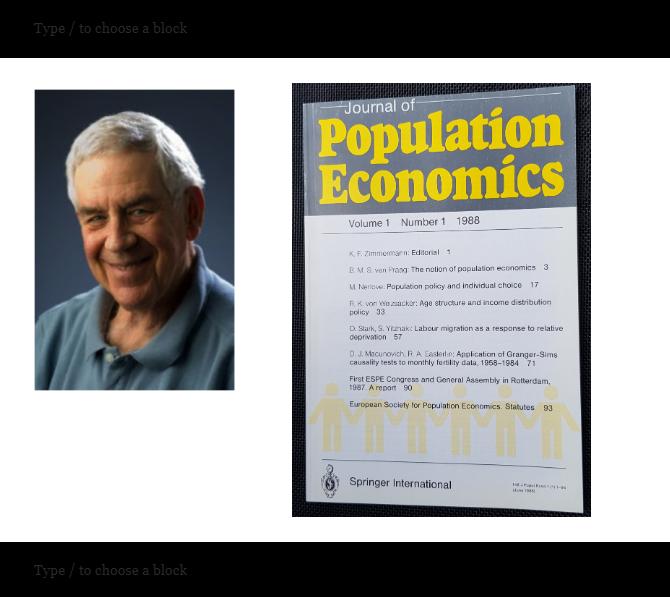Marc Nerlove, legendary economist and econometrician, died at age 90 on July 10, 2024. He was an inspiring figure and has heavily influenced many research areas in economics and econometrics. See the Marc Nerlove Memoriam Page honoring his legacy of the Department of Agriculture and Resource Economics at the University of Maryland, his last university affiliation. See also my notes in the context of celebrations around his 80th birthday.
- I worked for Marc and my doctoral thesis supervisor Heinz König in the 1980s for their joint project on “Business Survey Data Analysis”. The project made categorical business test data available for innovative IO research.1,2 This gave me access to categorical data, proper econometric methods, and ideas that made a major part of my early career and population success.3
- He also encouraged me to work on my thesis on “Population Economics”, bringing Gary Becker‘s ideas about family economics into the German academic debate.4
- Marc brought me to the University of Pennsylvania, where I taught classes in macroeconomics and population economics as a Visiting Associate Professor during the calendar year 1988.
- He also supported me creating the European Society of Population Economics (ESPE) and the Journal of Population Economics (JOPE). He was a founding member of ESPE and one of the keynote speakers of the First ESPE Congress in Rotterdam. His lecture on “Population Policy and Individual Choice” was published in the first issue of JOPE in 1988.5 The conference picture (see link) has him upper left next to R.K. von Weizsäcker. Many of the activities for the creation of ESPE and JOPE in 1988 were conducted from my Penn office close to his.
- Marc Nerlove was a wonderful person, an inspiring scientist and a great colleague. Thanks & RIP.
References
(1) König, H., Nerlove, M., and Oudiz, G. (1981). On the formation of price expectations: An analysis of business test data by log-linear probability models, European Economic Review 16, 103-138.
(2) Nerlove, M. (1983). Expectations, Plans, and Realizations in Theory and Practice. Econometrica 51, 1251-1279.
(3) Zimmermann, K. F. (1997). Analysis of Business Surveys, in: M. H. Pesaran and P. Schmidt (Eds.), Handbook of Applied Econometrics, Volume II – Microeconometrics, Blackwell Publishers, Oxford, 407-441.
(4) Zimmermann, K. F. (1985). Familienökonomie. Theoretische und empirische Untersuchungen zur Frauenerwerbstätigkeit und Geburtenentwicklung. Springer-Verlag. Berlin. Heidelberg. New York. Tokyo.
(5) Nerlove, M. (1988). Population Policy and Individual Choice. Journal of Population Economics 1, 17–31. https://doi.org/10.1007/BF00171508.
Free to read: https://rdcu.be/dNO3b

Ends;

